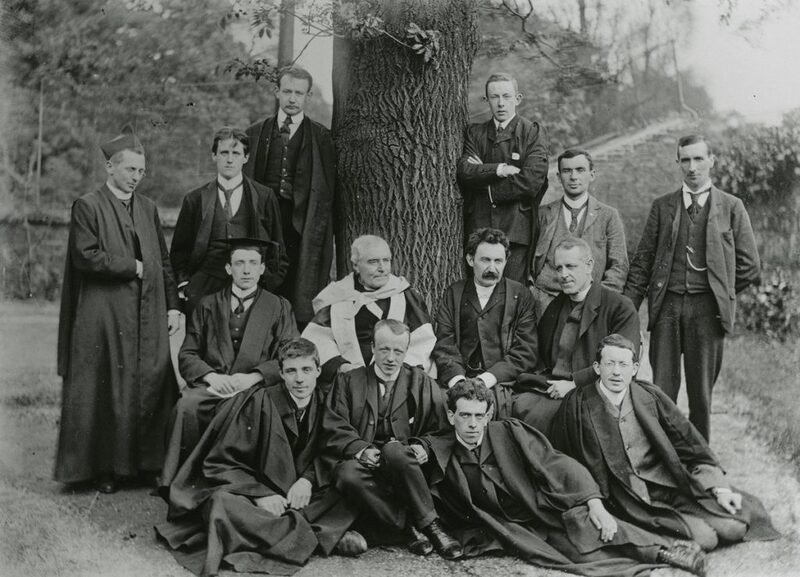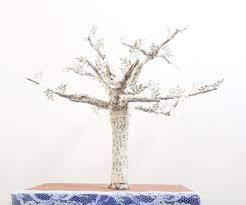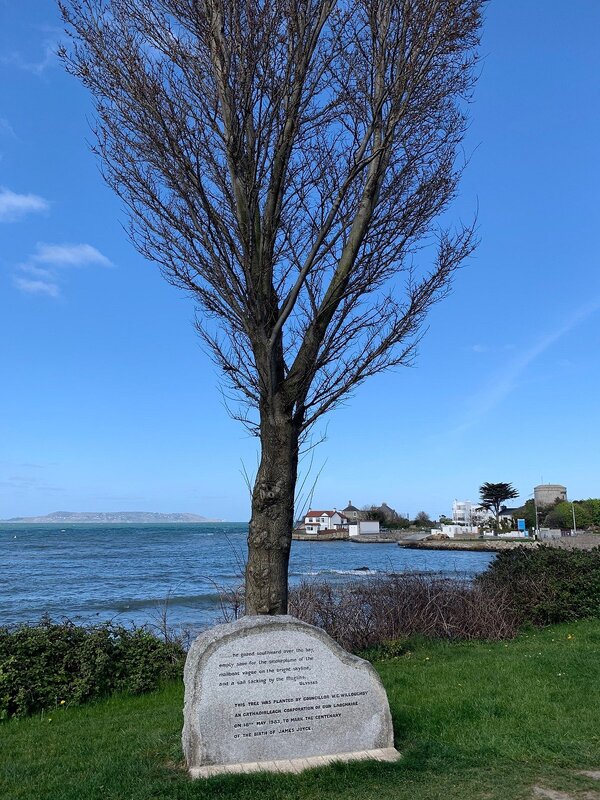Julianne Seidel (editions)
Rationale:
Part I: Description of the object
I came across this book and I was immediately astonished by how big it was and how heavy it is even compared to our hefty class copies of Ulysses. It is the Egoist Press edition with the turquoise/blue cover. The pages are roughly 2 to 3 (I would say) times thicker than the average paper page and had about two thirds of the writing on them, making it much thicker - thus requiring a substantial amount of paper. The book itself is mostly beige while the title page is a faded turquoise color (can presume it used to be a lot brighter and bolder), the paper is an off-white/ rustic color, the font is bold and dark. It’s also dense and a lot heavier than the other copies in the archives. On the first few pages, it stated that there were 2000 copies published by Egoist Press, this particular one is number 902.
Part II: Why I selected it
When I read how many copies were yielded merely from that one publisher, it really made me question the environmental impact that book publishing had in the early 1900’s and more specifically during the roaring 20’s/ the time period that James Joyce’s Ulysses was published and becoming unfathomably desired (and banned). This object also made me think of the kinds of people that were buying it, displaying it on their bookshelves as a means of status and merely to be able to say they owned it. I chose this particular object because it made me question whether or not this was the period in history (the roaring twenties) when people began completely disregarding the importance of nature and the environment around them. It made me wonder if this is when the uproar of ecological ignorance rooted itself, in the minds of people too occupied by the status that the book supposedly came with, then the production and materials that it actually required to produce the book. I selected it because I believe it possesses this certain pretentious energy to it, its specific color that could be easily recognized in library’s or bookcases, the way it is so different from other books. It gives off this “I’m smart enough and rich enough to own this even though I don’t understand it”.
Part III: How I speculate it will relate to some aspect of the novel/what I hope to discover in my research into it/what I want to argue with it as my primary example
I want to know why it was so important to have it. I want to understand why people wanted to have a copy of Ulysses SO bad that they were willing to go through extravagant processes to get their hands on it. I want to understand why this book made you so cool. I mean it’s human nature when someone tells you that you can’t have something, it makes you want it even more which is basically what happened with Ulysses. It was banned and then people were like screw that I’m getting it one way or another, and I want to know why. Why was this book so important to merely own in the early to mid 1900's? What was so great/ powerful about it? I also want to talk about how books and reading in the 1920’s may have started the one of the greatest environmental disasters on the planet - deforestation (if I have time/resources).
Short Lit Review
What am I researching (or at least trying to)?
I’m trying to identify the presence of (and sometimes lack-thereof) ecological recognition in Ulysses, related to the relationships that humans possessed with nature at the time Ulysses both took place and was published.
Book: Greenwood by Michael Christie
A fictional novel that looks at the past, present and future of trees. It portrays the naive ways humans took/ continue to take advantage of trees globally. This book is split into sections/ years, one being 1908. This section conveys the relationship that people realistically had with the trees during that time - ignorantly logging them as if they were of endless abundance. Similarly to what was actually going on in the early 1900’s. This novel scrutinizes the way in which extraction of resources (particularly trees) in the early 1900’s was done with little to no consideration for the environment - seeing the earth as endlessly bountiful. With my argument premising on the relationships with nature that both characters of Ulysses and people at the time of publication, possessed - this novel perfectly depicts how these particular relationships impacted the way we viewed the environment then and how that reflects today.
Article 1:
Ecocriticism, Joyce, and the politics of trees in the ‘Cyclops’ episode of Ulysses
By James Fairhall
Fairhall applies ecocriticism to Ulysses in an attempt to understand the depiction of the interrelationship between the natural and the human worlds on 16 June 1904 (Fairhall). In the chapter ‘Cyclops’, he observes that John Wyse Nolan refers to lord Castletown’s report on deforestation, written because of exhaustion of Irish forests being purchased and used for agriculture. Fairhall argues that the ‘Cyclops’ episode melds the tree-planting Anglo-Irish with the Catholic nationalist proponents of forest restoration, particularly with the parody of the Citizen and Nolan’s conversation of Ireland’s “vanished natural riches'”. Fairhalls essay looks at expanding the politics of trees in Ulysses and says “If we admit that the ghosts of Ireland’s lost forests haunt today’s biodiversity-depleted Irish landscape, then they haunt the pages of Ulysses as well.” (Fairhall, 2012). Given that I am arguing how the relationship humans possess with nature was heavily influenced by those in the early 1900’s, this article provides proof that James Joyce was fully aware of the deforestation in Ireland and the impact human’s had on the environment - distancing themselves from the naturalness of the relationship.
Article 2:
Private Property, Public Interest: Bloom's Ecological Fantasy in "Ithaca"
By William J. Kupinse
Kupinse explores the function of green in Ulysses - particularly in the “Ithaca” episode with Bloom’s fantasy of living in an ecologically sustainable house and the environmentally engaged proposals. This dream of Bloom’s captures ecocritical attention and asks the question of how did Joyce position himself, his characters and Ulysses in the environment? While Fairhall discusses the haunting lack/ awareness of forest/ deforestation in Ulysses, Kupinse brings forth how in “Ithaca”, there are always going to be public-works infrastructures that are embedded in the landscape and the idea of integrating the human and natural world through Bloom’s dream of his ecologically/ environmentally conscious house. Kupinse’s article inspired me to also consider in my developing argument, the constant and rather necessary presence of public infrastructures that create boundaries between human and nature that make it difficult to consciously possess a relationship at all.
Article 3:
‘I am getting on nicely in the dark’: the environments of ‘Proteus’
By Robert Brazeau
While Fairhall and Kupinse took critical approaches to Joyce and his portrayal of the environment in Ulysses, Brazeau argued that Joyce was an early observer of the ways humans inhibit nature and vice versa - particularly looking at ‘Proteus’. He describes how ‘Proteus’ is interesting because a character transpires outside of a recognisably urban space (SD in a coastal zone). Brazeau argues that in ‘Proteus’, Joyce conveys Stephen’s interior state in relation to his exterior environment and how he is ‘both “in” and “of” nature’. Brazeau identifies how Stephen’s actions, words, emotions almost mirror the environment and how Joyce made this clear human to nature connection. In ‘Proteus’, conceptual boundaries between human and the non-human begin to dissolve (Brazeau 2022). This psychological behavior inflicted by the environment is further evidence for my argument, that Joyce integrated the environment into his novel by having his characters be connected to it in ways other than purely physical.
Article 4:
Nature, Existential Shame, and Transcendence: An Ecocritical Approach to Ulysses
By James Fairhall
Using another work by Fairhall, now looking at Stephen Dedalus and how co-creating both the sensible world and the selfin-nature, the body endows us with pleasure and delight, simultaneously making us feel what the ecologist William Jordan III terms ‘‘existential shame.’’ Which in other words is a sense that humans feel they just don’t fit in with the environment or feel worthy enough to live amongst it’s beautiful and bountiful. In this essay, Fairhall looks at the spiritual connection we (and in particular Stephen Dedalus) possess with our surrounding environment and how that shapes our understanding and relationship with it. This argument is unique from the others because Fairhall argues that by the time Joyce wrote “Proteus”, he had become a philosopher of nature and that Ulysses investigates and represents the complexity of nature as the giver of life and the transcorporeal interweaving of nature and human. Lastly, with my argument stressing the importance of human relationships with nature, this article emphasizes Joyce’s character Stephen possessing deep spiritual connections with the environment around him, posing him as a crucial character in the development of my argument.
Short Paper
Object and approach vs. the text of Ulysses itself:
The object that I chose is the Egoist Press 1922 turquoise edition of Ulysses and ultimately, my goal is to find out how Joyce integrated ecology and human-nature relationships into his novel and how this in turn, reflects the actual relationships that would have existed in the time the novel was both published and took place. I concluded that the mere way in which the book was published, manufactured and designed, goes to show the lack of environmental consciousness that occurred in the publishing of it, as well as both the presence and lack of environmental awareness in Joyce’s novel. Ireland itself experienced severe deforestation in the 1600’s when wood was needed to build ships, ironically to enable massive expansion of the empire! This particular object goes to show how the printing/publication and extraction of resources in the early 1900’s completely abandoned ethical values, moral obligation and preserving any relationship with the environment.
Parts of the novel/ quotes that relate to approach/object:
Though ironically enough, Joyce was also able to simultaneously incorporate the most ideal form of a relationship that a human could possess with nature. In the chapter Ithaca, Bloom fantasizes about water.
“It’s hydrostatic quiescence in calm: its hydrokinetic turgidity in neap and spring tides: its subsidence after devastation: its sterility in the circumpolar icecaps, arctic, and antarctic: its climatic and commercial significance: its preponderance of 3 to 1 over the dry land of the globe: its indisputable hegemony extending in square leagues over all the region below the subequatorial tropic of Capricorn: the multisecular stability of its primeval basin: its luteofulvous bed: its capacity to dissolve and hold in solution all soluble substances including millions of tons of the most precious metals:.. it’s vehicular ramifications in continental lake-contained streams and confluent oceanflowing rivers with their tributaries and their transoceanic currents, gulfstream, north and south equatorial courses: its violence in seaquakes, waterspouts, Artesian, wells, eruptions, torrents, eddies, freshets, spates, groundswells, watersheds, waterpartings, geysers, cataracts, whirlpools, maelstroms, inundations, deluges, cloudbursts… its ubiquity as constituting 90% of the human body…”
(Ulysses, p 549, 185-228)
What I found most interesting in this answer is that Bloom expressed nearly every function of water and refrained from mentioning a single thing about how humans benefit from it/ need it. Brilliant. Throughout the novel, Bloom is also shown to have a love for animals and wildlife and has a very caring and nurturing personality and for that he is actually looked down upon and taunted in the novel. While Joyce highlights the importance of possessing knowledge and a profound relationship with nature, he also portrays how in this time, those relationships were rejected from society.
Elements of the novel/theme, problem, styles they engage:
My argument ultimately focuses on how Joyce integrated an ecological lens into Ulysses, creating this idea of human to nature relationships in the 1900’s and how Joyce is almost protesting the real world relationships that existed at the time. In Ulysses there is a recurring natural element present. In the chapter Cyclops the character John Wyse Nolan actually refers to lord Castletown’s report on deforestation, written because of exhaustion of Irish forests being purchased and used for agriculture. This is one of the only moments where there is actual acknowledgement of ecological destruction. Though, elements of the novel that suggest Joyce was actually consciously aware of the ongoing ecological disaster, are observable in small throughout the novel, particularly in “Ithaca”. It was as though Joyce knew the consequences of publishing a novel, knew the consequences that would come of his work and almost apologized in his novel. Hence why he was keen on constructing characters that had spiritual, physical and emotional connections to the environment around them.
Work Cited:
Joyce, J. (2022). Ulysses. Vintage.
Christie, M. (2019). Greenwood. Penguin Random House - McClelland & Stewart.
Fairhall, J. (2012). Ecocriticism, Joyce, and the politics of trees in the “Cyclops” episode of
Ulysses. Irish Studies Review, 20(4), 367–387.
https://doi.org/10.1080/09670882.2012.739355
FAIRHALL, J. (2012). Nature, Existential Shame, and Transcendence: An Ecocritical Approach
to Ulysses. Joyce Studies Annual, 66–95. http://www.jstor.org/stable/26288771
Kupinse, W. J. (2015). Private Property, Public Interest: Bloom’s Ecological Fantasy in
“Ithaca.” James Joyce Quarterly, 52(3/4), 593–621.
http://www.jstor.org/stable/45172698
Robert Brazeau (2022) ‘I am getting on nicely in the dark’: the environments of ‘Proteus’,
Textual Practice, 36:2, 205-222, DOI: 10.1080/0950236X.2022.2003090
https://8billiontrees.com/trees/how-many-trees-cut-down-each-year/#:~:text=If%20you've%20ev
er%20wondered,are%20lost%20annually%20to%20deforestation.&text=While%20that%
20number%20is%20staggering,a%20little%20easier%20to%20grasp.
https://www.instructables.com/3D-Book-Page-Tree-Sculpture/



